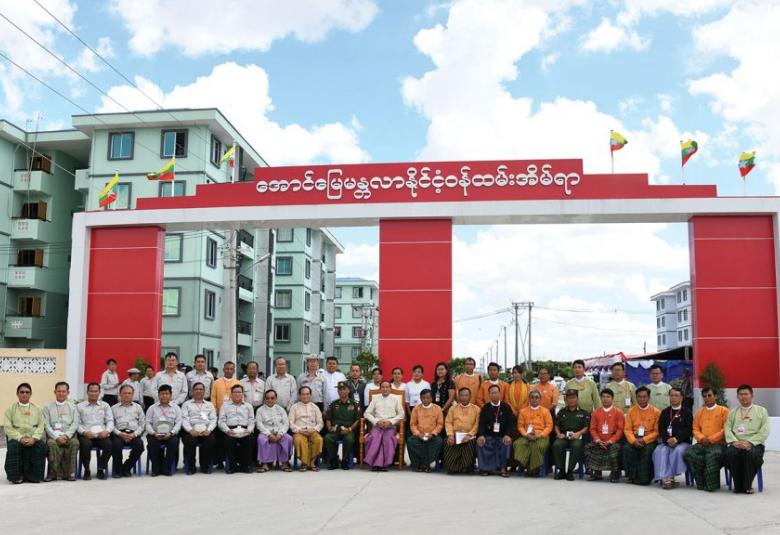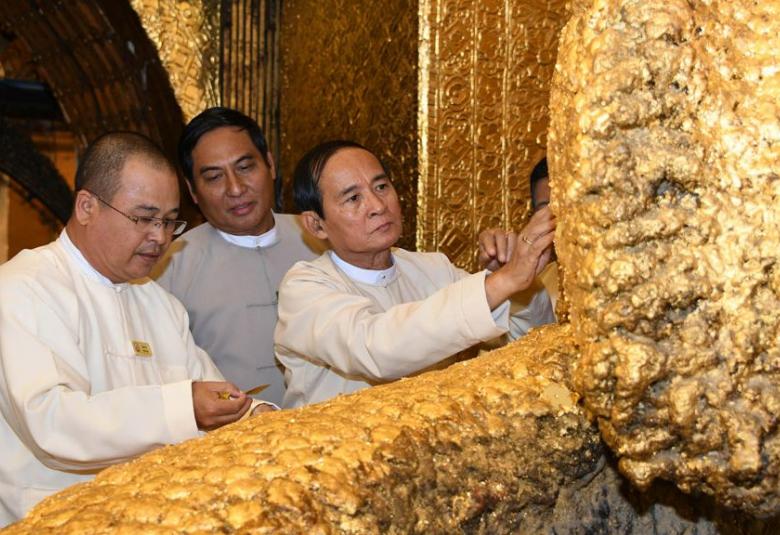President U Win Myint met with Mandalay Region Government; Region Hluttaw; Region High Court; (Pyithu, Amyotha, Region) Hluttaw representatives; Region, and District and Township departmental officials at the Mandalay Convention Center yesterday morning and gave a policy guidance speech.
Also present at the meeting were Union Ministers Lt-Gen Kyaw Swe, Thura U Aung Ko, Dr Myint Htwe, U Han Zaw and U Ohn Maung and officials.
In his guidance speech the President spoke of setting a firm resolve towards establishing a Democratic Federal Republic as the entire citizenry has a strong desire for democracy reforms. In the same way all ethnic people want to establish a federal system. As such a policy of setting up a new democracy federal system was established. For this resolve to be successful all of us who are on the same boat going towards the same destination must coordinate and work together.
A democratic system assured the freedom, security, happiness and life of all citizens and ethnic people. In addition to this, freedom, justice and equality exist. Such were the practices of democratic countries. Ethnic nationals live together in our country. It was called a union because of the inclusion of ethnic people.
If it’s a union it must be a federal country. The country’s sovereignty permeates into the states and regions in a federal country. The rights to sustain and develop ethnic people’s literature, culture, language and tradition; for self-acturinistration for self-determination; for equalities are obtained. The Union Government holds onto a policy of a balance development of all states and regions.
A politically, economically and socially fair administrative system is the type of administration that we want in establishing a democratic federal republic. All citizens have equal opportunities, equalities and are equal in the face of the law. It must be an administrative system that preserves the rule of law, and not one that leads to the oppression of people. It must be an administrative machinery that ensures the safety and happiness of the people. The administrative machinery must give security of life and happiness to the people.
In a democracy the people are the parents and must be people centered. In dealing with the people, the administrative pillar must serve the people. People had given us the authority for the democratic transition. We must be dutiful and respectful in serving the people. We must continue towards the goal where sovereignty resides with the people.
In the legislative pillar, there are laws, rules, constitution and prevailing laws related to the Hluttaw. Whether the laws were truly beneficial for the country and people, appropriate to the situation of the respective places or not were to be reviewed and assessed. If a new law is to be enacted for the State/Region, care must be taken so that it is within the parameters of the legislative framework. A democratic country could not be established without rule of law. Rule of law was the foundation of a democratic country.
Hluttaw representatives need to coordinate with relevant officials in regional development matters. They need to be well versed in their rights, laws and rules. The legislative sector had oversight responsibility towards preventing wastage of public funds.
The three pillars namely the administrative, the legislative and the judiciary need to check and balance one another while coordinating matters together. They need to cooperate and work together towards development of the country, peace and prosperity of the citizens. The three pillars must not influence the other pillar and such influences are not a democratic practice. Having an unrivaled opportunity to perform a historic duty during a transition towards democracy, officials of the three pillars and officials from departmental organizations must not consider one another as rivals but as colleagues and are required to coordinate for the benefit of the country and the people.
The judiciary pillar must be un-biased. Judgments were to be made according to prevailing laws such as Union Judiciary Law, prevailing law, criminal and civil law etc. The judiciary upholds the basic principle of being unbiased. All citizens must be equal before the law. Regardless of wealth or status , all are equal in the face of the law. No one is above the law and no one must interfere in legal judgments.
Justice is the concern of all citizens. Only when justice is strengthened will the democratic system be strengthened. All need to establish a just society. We, ourselves, need to change and the outlooks and practices of all departmental personnel need to change too.
Change is connected to development and prosperity. Change or reform is not something to be scared of. It is a good friend for us and our country. Reform or change is not a threat. It is an opportunity for peace and prosperity of the future generation of the citizens.
Departmental organizations that deal with the people need to connect with the people in a pleasant way. They need to fulfill their duties. It is human dignity to perform assigned duties. A person is valued according to how that person performs his/her historically duties. Judgment will be made by future generations. All personnel in attendance need to guide their subordinates. This is a matter that need to done quickly. Serve for the sake of the people and for the sake of the country’s development. Give priority to resolve the difficulties faced by the people, said the President.
Next, Region Chief Minister Dr Zaw Myint Maung, Region Hluttaw Speaker U Aung Kyaw Oo, and Region Chief Justice of the High Court U Soe Thein explained about regional development works, future work processes and requirements, Hluttaw affairs work and judiciary work respectively.
President U Win Myint then said the judiciary sector must uphold, protect and raise fundamental rights and human rights of the people. Responsible officials must regularly inspect police detention centres and prison cells. Cases must be tried correctly and speedily. Witness fees incurred by the government need to be disbursed properly. Confiscated evidence must be expeditiously managed and disposed to prevent wastage of state funds.
Motions tabled in State/Region Hluttaws must be beneficial for the State/Region. Pledges in Hluttaw must be given only when the Region Government is able to perform it. Hluttaw representatives must perform their work according to rules and regulations. Departments need to resolve farm land and other land matters speedily. Released lands are to be returned to the rightful owners according to policies set. Region Governments must implement the policies, work processes and guidelines of the Union Government. The correct and speedy conduct of state/region governments were linked to development. All citizens had their own capability and beauty. These were to be used effectively in nation building, said the President.
After the meeting, the President cordially greeted the meeting attendees. Later in the afternoon the President went to the Mandalay People’s Hospital to inspect health care provided to patients and donated K 1 million to Mandalay People’s Hospital superintendent Dr Tin Tin Moe and Cancer Department Head Professor Dr Aung San Oo.
Next the President went to Aung Myay Mandalar Public Servants Housing in Mandalay Region Patheingyi Township and observed the transparent allocation of apartments through drawing of lots.
From there the President went to pay homage to the Maha Muni Buddha image and offered gold plates and made cash donation.
This was followed by the President visiting the Myotha Industrial Garden Project to inspect construction of factories. — MNA (Translated by Zaw Min)




